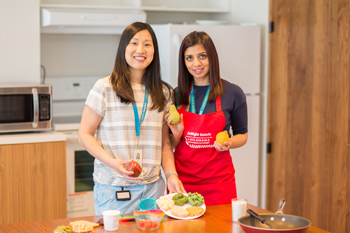Community kitchen enhances food skills one meal at a time

By Greg Winson

Registered dietitians Liza Luu and Punya Puri teach healthy eating habits in the community kitchen sessions. (Photo by Yuri Markarov)
New immigrants to Canada face many social challenges, including food insecurity, which disproportionately affects newcomers.
With food prices rising, many are unable to afford healthy food options and instead turn to unhealthy processed foods, sometimes without knowing the health consequences. Others wind up relying on take-out or fast food as an alternative due to competing obligations that take time away from cooking. Meanwhile, diabetes and cardiovascular disease tend to be higher among immigrant populations.
Sumac Creek Health Centre registered dietitians Liza Luu and Punya Puri are working to address food insecurity and promote health and nutrition. They partnered with the Regent Park Community Food Centre to run a community kitchen with an emphasis on health promotion and prevention. It’s a five-minute walk from Sumac Creek and offers drop-in meal services, cooking programs and gardening programs to the community.
The Regent Park Community Food Centre already had some programs running for Bengali women in the area, including a garden group. This garden group along with other drop-in guests became the regular participants for the registered dietitian-led community kitchen.
Each session starts with a discussion of the recipe and methods. Some participants are engaged in the food preparation process, chopping up vegetables or mixing and adding ingredients, while others are involved in the cooking. The goal is to make sure everyone is engaged and has a role they are comfortable in.
 RECIPE: Bean salad Serving size: 2 Ingredients: ½ cucumber 2 medium tomatoes 1 small red onion ¼ cup cabbage 1 large carrot 3 tbsp coriander leaves 1 green chili pepper ½ can of chickpeas 2 tbsp lemon juice ¼ tsp black pepper ⅛ tsp salt Directions:
|
“After we are finished cooking, we sit together and eat and talk about the nutritional benefits of why we chose that recipe, along with a general discussion about healthy eating,” said Luu. “These kinds of programs are a big support to encourage people to get out of their houses and collectively share in the process of creating a meal together; which can be a powerful social connection.” Any food left over from the classes goes home with the participants.
This community kitchen helps to enhance participants’ food skills as well as learn about components to healthy eating while on a budget. “A lot of people don’t even know how to use knives, so it can also offer an introduction to basic cooking skills,” said Puri.
The sessions also allow the participants to learn about lifestyle modifications to reduce the risk of developing chronic diseases such as diabetes and cardiovascular diseases. This partnership aligns well with St. Michael’s Hospital’s mission statement and strategic plan, which emphasize the importance of building strong community relationships and developing specialized services for those in need through creative initiatives.
From this registered dietitian-led community kitchen, other opportunities have emerged including a nutrition-themed discussion preceding a community kitchen for people with acquired brain injury, and the ‘Ask Your RD’ drop-in table to ask questions or pick up resources.
About St. Michael’s Hospital
St. Michael’s Hospital with Providence Healthcare and St. Joseph’s Health Centre now operate under one corporate entity as of August 1, 2017. United, the three organizations serve patients, residents and clients across the full spectrum of care, spanning primary care, secondary community care, tertiary and quaternary care services to post-acute through rehabilitation, palliative care and long-term care, while investing in world-class research and education.
